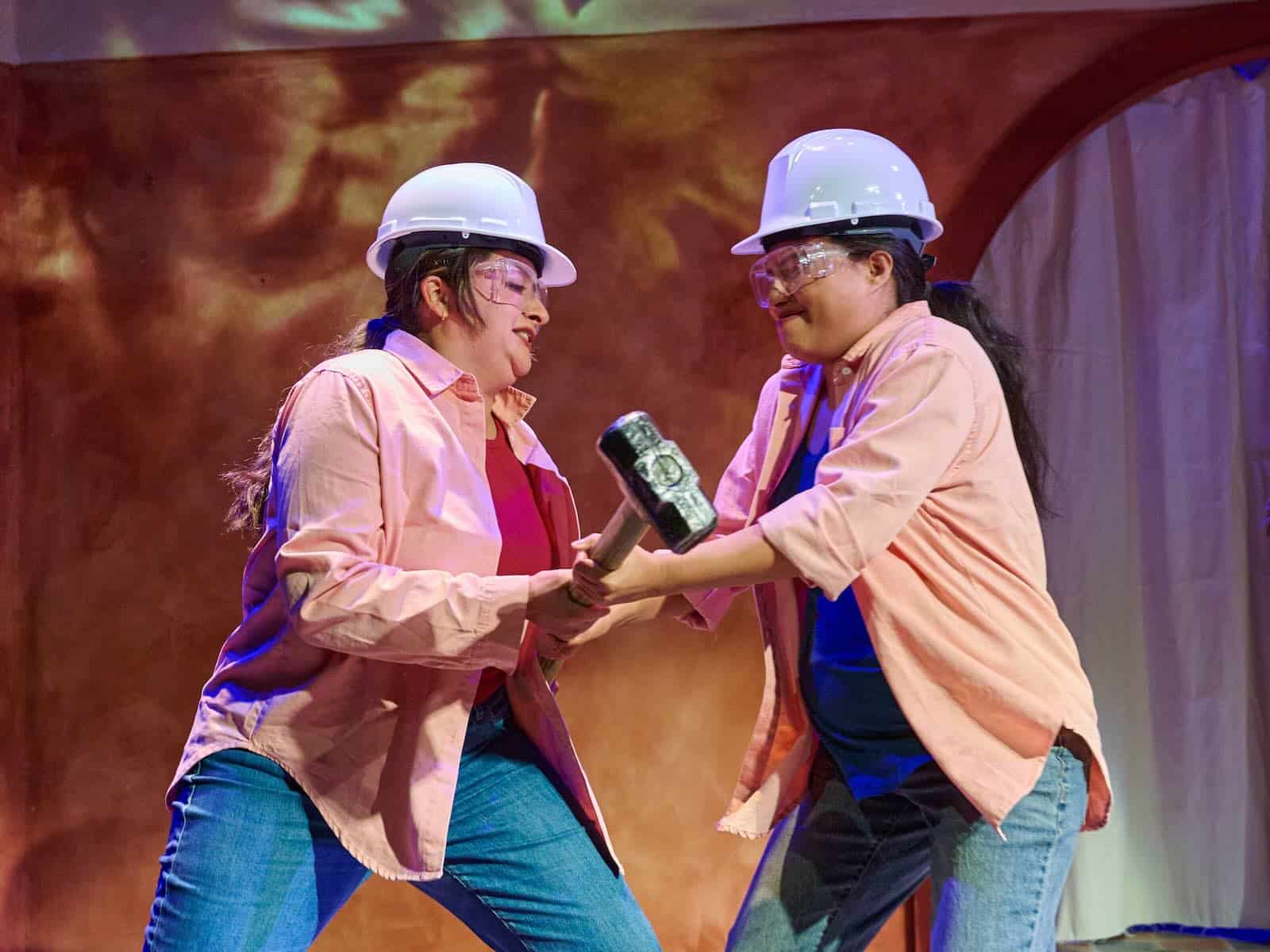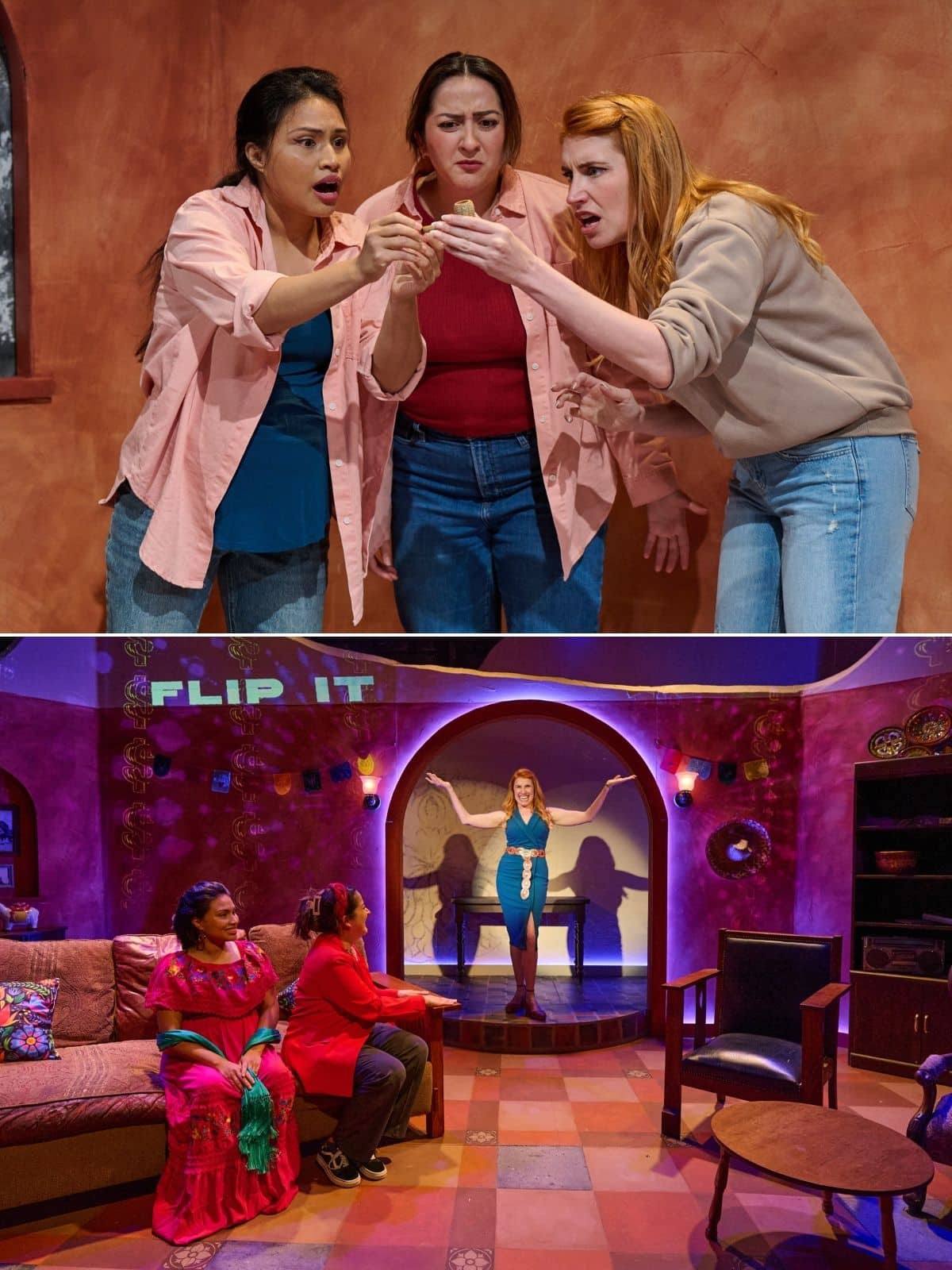The concept of the “American Dream” is tossed around quite a lot. It’s a concept that was originally dreamt up hundreds of years ago and has paved the way for an idealistic nation. It would have us believe that, despite where you come from, anything is possible in the land of the free and the home of the brave. But now, in a world that is rapidly changing, how might our image of this dream of American success differ, and what might it cost us to achieve?
Dream Hou$e, playing now at NextStop Theatre through October 5, is a surprisingly comedic yet darkly poetic surrealist satire that forces audiences to confront the insidious nuances of today’s deepening racial, social, and economic divides, where personal identity is constantly challenged by the limitations of the boxes we are forced to inhabit. Directed by Dylan Arredondo, this meta piece from playwright Eliana Pipes is a modern moment that shouldn’t be missed.

The story centers around the complicated dynamics between two fourth-generation Mexican American sisters, Patricia (Cristina Sanchez) and Julia (Ixchel). Following the death of their mother, the two sisters reunite in their ancestral home, which will be the focus of the next installment of an HGTV-type show called Flip It and List It. As the show — along with its dangerously disarming host, Tessa (Jule Nelson-Duac) and her team — slowly infiltrates the Castillo family home, the two sisters find themselves forced to face several bitter truths, unable to repress or run any longer.
The elder sister, Patricia, is an ambitious caretaker who put her career and dreams on hold to move back home and tend to her dying mother. With her mother now gone, she is anxious to rid herself of the house filled with so many difficult and dark memories and, with the money she’d make from selling the house, begin building a life of success, luxury, and power. In a rather visceral scene near the end of the show, Sanchez gives a truly raw and (literally) stripped-back performance that shows us just how much she’s willing to sacrifice in order to gain that prominent lifestyle — the one she’s coveted since her youth.
On the other hand, Patricia’s younger sister, Julia, is a free-spirited, emotionally driven soon-to-be single mother who relies on homeopathic and herbal remedies (yet prefers the new, gentrified coffee shop in the neighborhood over the traditional one next door). Ixchel’s energetic yet grounded performance showcases the contradicting ideologies battling inside Julia. Despite leaving home as soon as possible and abandoning familial responsibilities, Julia now finds herself overly nostalgic for the life she left behind, romanticizing the history and culture of her Mexican roots which, allegedly, run deep in that house.
The play is performed without an intermission, which allows the tension and darkness in the story to build and consume the audience in a psychedelic whirlpool of electrically charged emotions. However, the dark undertones are balanced by some truly hysterical moments — albeit often dark humor. There were several occasions where I, actually, found myself laughing out loud — which, in my case, is a pretty high bar.

The show was elevated even further by the novel, yet incredibly successful, sound and light design elements courtesy of Sound Designer Madeline “Mo” Oseljsek, Lighting Designer Alberto Segarra, and Multimedia Designer Zavier Augustus Lee Taylor. Indicative of HGTV Reality Show tropes, various lighting effects were painted across the rustic home’s original adobe walls, displaying cartoonish images and writing, purposefully undercutting while also underscoring the moments of appropriation and assimilation. The images displayed on the backdrop grow darker as the characters’ (as well as the house’s) demons are revealed.
The lighting was also used to weave in moments where the sisters halted the main conversation with a wave of their hand, allowing them to have private conversations in which they relinquished the pretenses put on for the cameras and let their true opinions and emotions be heard. Each time this happened, the room transformed under a silent blue haze that swept the stage as everyone else stilled until one of the sisters flicked their hand once more and reality resumed.
Costume Designer Ilyana Rose-Dávila, Props Designer Jason Dearing, and Scenic Designer Grisele González also played a large role in enhancing the overall success of the narrative. For instance, immediately upon arrival (or, rather, invasion), the production crew of Flip It and List It dressed up the house with offensive, stereotypical items, such as random sombreros and porcelain donkeys, and then forced the sisters into brightly colored, stereotypical clothing. Patricia awkwardly accepted the clothing, while Julia was a bit more reluctant. This dynamic was felt throughout as they debated the complexities of respecting one’s past while still striving for a “better” future.
The production, construction, camera, and design crew of Flip It and List It (played by Leela Avilés-Dawson, Carianmax Benitez, and Sadie Koopman) maneuvered across the stage, always present but never heard, a dance that magically mirrored and enforced the tone of the show. When they weren’t frozen in place during the sisters’ private moments, they were strategically moving about the set, carefully manipulating each piece of furniture, drawing curtains, spreading plastic sheets across the floor, stripping the once-inviting and loving home of its remaining life force.
Dream Hou$e is a truly unique experience. It hops agily through a course of artful metaphors without ever feeling pretentious or cliché. It explores complex realities such as generational trauma, gentrification, cultural assimilation, cultural appropriation, rampant consumerism, and mass desensitization. This desensitization is mirrored for us directly when the show’s metastructure turned in on itself one more time. Directly following the darkest moment in the show, Host Tessa suddenly emerged from behind the seats at the top of the stairs, her eerily wide smile appearing first like the Cheshire Cat. She descended through the audience and began speaking to us as though we were a studio audience. She encouraged us to clap and chant along with “Flip It and List It!” Despite the two sisters standing broken and defeated on either side of the stage, several members of the audience joined in with Tessa’s big clap and loud chant.
There’s, honestly, quite a lot I could say about this show, but won’t for fear of spoiling any of the shocking twists and turns. It’s a show that simply must be experienced firsthand.
Running Time: 90 minutes, without intermission.
Dream Hou$e plays through October 5, 2025, at NextStop Theatre Company, 269 Sunset Park Drive, Herndon, VA. Tickets are $45 and available online or by calling 703-481-5930 x1.
The program is online here.
Dream Hou$e
By Eliana Pipes
Directed by Dylan Arredondo
SEE ALSO:
NextStop Theatre kicks off 2025/26 season with ‘Dream Hou$e’ (news story, August 26, 2025)



